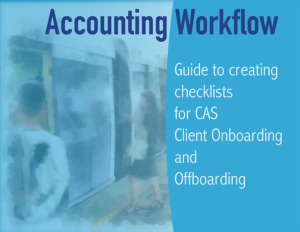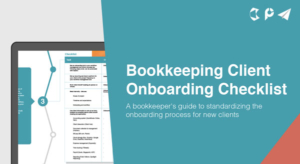Learning how to delegate work is essential if you want to scale your firm profitably. But when it’s a firm you have invested hundreds of hours in founding and nurturing, sometimes delegating isn’t easy.
Create written procedures and task checklists
Clearly written procedures are an essential ingredient of delegation. Many firm owners hesitate to turn client work over to staff because they worry about the work being done ‘right’. Written procedures and task checklists are the answer to that worry.
When you take the time to write good procedures you are creating a bank to store all of your experience and unique techniques gleaned from countless hours of work done, mistakes made, and lessons learned. Sharing this knowledge with your staff ensures that they will do the work the way you’d do it.
Provide staff resources needed to complete the work
As your staff works to complete client tasks, they will need access to various bits of data. Making sure they have access to everything needed to get their work done is the job of the firm owner. Passwords (for things like bank logins, sales tax portals, payroll applications, and tax authorities) need to be kept in a secure, but central, location. Other information is just as crucial: client contact information, access to a record of work done in the past for the client, general notes about the client (like tax entity, fiscal year-end, tax id number, even what version of accounting software they use), and where to find and store client documents.
Whether you choose to use a team version of a password keeper in conjunction with a document management system and detailed client notes or take advantage of a system like Aero Workflow, make sure you develop a system of storing client resources that everyone in the firm understands and complies with.
Remove yourself as the bottleneck
Every time a staff member has to stop their work to ask you a question, that is you being a bottleneck. If they have a question about how to perform a task, it’s a signal that you need a new (or improved) procedure. If they need a resource or information about a client, it’s a sign that you need to add that information to the client notes or password vault.
Of course, there will be times when you need to review client work or help new staff with training. However, if you find that your involvement in a workflow process is preventing client work from being completed on time, you need to stop and ask yourself a few questions: Does this work absolutely have to be done by me? Can I train a current staff member to do it? Is it time to hire a senior-level team member to do this work? What other, profit-producing activities am I not doing because I am stuck doing this work?
Plan for interruptions in your day
All the organizing and planning in the world cannot prevent unplanned work from coming your way. An essential part of delegating is to expect the unexpected and make a plan for how you will handle it. Maybe your plan is to delegate reading and responding to client communications to a certain time of day or assign the task of being the ‘first responder’ to a certain person. Perhaps you have a policy of answering client phone calls right away but delegating any work they generate to another person or another time. Whatever your plan is, make sure it is clearly defined and communicated to both clients and staff– and then stick to it. Otherwise, you may find that the important work of managing your firm is soon buried by all those ‘urgent’ interruptions.
Focus on the big picture in your firm
A good workflow and practice management system like Aero will provide you with an overall picture of your firm and the status of client work. This allows you to see the big picture and keep an eye on client work without micro-managing your team and interrupting them for status updates. When you have successfully delegated tasks, you can step back and see the big picture, focus on improving KPIs, and scaling your firm.











